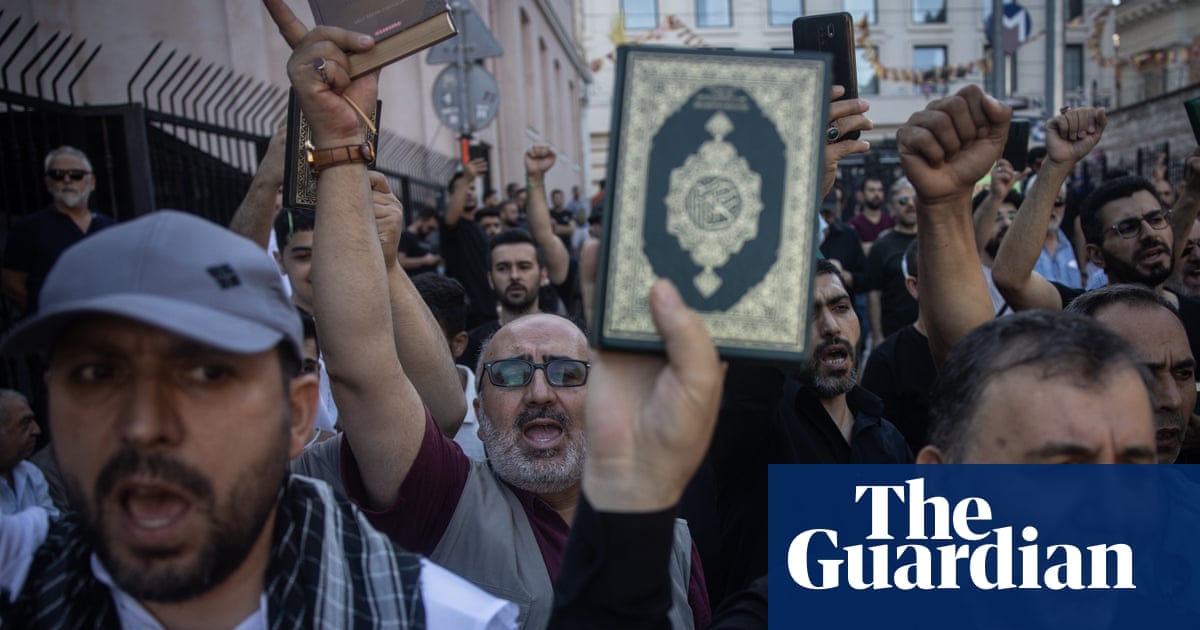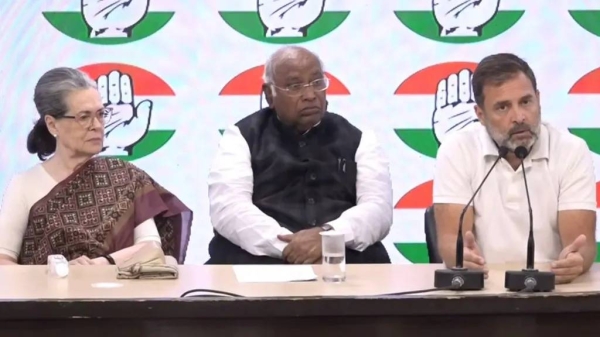
The Swedish prime minister, Ulf Kristersson, has accused outsiders of exploiting the country’s freedom of expression laws and using them as “a stage for spreading hateful messages”, after a diplomatic crisis erupted over Qur’an burning protests.
There have been a string of protests in Sweden and Denmark in recent weeks at which copies of the Qur’an were burned or otherwise damaged, prompting outrage in Muslim countries and demands that the Nordic governments put a stop to the burnings.
Both countries said they were examining ways to legally limit such acts in a bid to de-escalate tensions.
Speaking in Stockholm on Tuesday, hours after two Iraqi men, who have taken part in previous such protests, were permitted to set fire to a Qur’an outside the Swedish parliament, Kristersson said such acts were “dragging Sweden into international conflicts”.
Warning that threats to the Scandinavian country had increased after the recent incidents, Kristersson said he was working “day and night” to respond to the issue and that he was in close dialogue with the Organisation of Islamic Cooperation (OIC), which has condemned the protests and called for the United Nations to intervene.
Standing alongside Gunnar Strömmer, Sweden’s justice minister, in front of a sea of blue and yellow Swedish and European Union flags, he struck an urgent and serious tone.
“As everyone knows we have a complicated security situation – both in and around Sweden,” he told dozens of gathered reporters, listing the war in Ukraine and Sweden’s pending Nato application, which is still to be approved by Turkey and Hungary.
Kristersson, leader of the Moderates party and who also leads a minority coalition that depends on the support of the far-right Sweden Democrats, added: “There are also actors who wish us harm in different ways, who are spreading false images of Sweden that are dangerous.”
A spokesperson for Kristersson declined to specify the identity of those posing a threat to the country, but confirmed that Russia is “one of several actors trying to influence Sweden through disinformation”.
Referencing disinformation campaigns in the spring and last year, Kristersson said the “Russian narrative that is spreading about Sweden” could be trying to prevent Sweden’s Nato membership by building an inaccurate picture of the country.
Individuals from inside and outside Sweden, he said “want to use Sweden as a stage for spreading hateful messages”.
On Tuesday night, Turkish state broadcaster TRT reported that a Turkish staff member at Sweden’s honorary consulate in Izmir had been shot and seriously injured in front of the consulate building. The assailant was a Turkish citizen with mental health issues, Reuters reported. Police were investigating the incident.
After talks over the weekend with neighbouring Denmark, which has also said it had seen a heightened terror risk as a result of the Qur’an burning crisis, Kristersson praised the Danish prime minister, Mette Frederiksen, with whom he said he was working closely.
The Danish government has said it will “explore” legal means of stopping protests that involve the burning of holy texts in some circumstances.
While Kristersson ruled out sweeping changes to freedom of speech laws, he said his government was considering changes that would allow police to stop Qur’an burnings if they posed a national security threat.
Kristersson said he wanted to stop dangerous people from coming to Sweden and that he was in daily contact with security services. “That is how serious we think the situation is,” he said.
He announced plans to strengthen border controls and give police greater power to stop and search people with a new law extending police powers and increasing surveillance.
Strömmer said: “Border controls are a measure that gives us the conditions to identify people coming into Sweden who could represent a threat to security.”
Describing Sweden and Denmark as “two of the world’s most well-functioning democracies” Kristersson said the countries stand up for democracy and religious freedom. But, he added: “We also have a shared assessment that it is a dangerous situation for our country and both of our countries when we are dragged into conflicts”.
His comments came after the OIC, which represents 57 countries, held a special session on Monday to discuss the recent developments, condemning the burnings as “despicable acts of aggression” and calling on the UN to intervene.
In a 35-point action plan, the organisation called on the UN secretary general to appoint a special rapporteur on combating Islamophobia and urged all governments to fully implement existing laws or adopt new legislation if needed, citing the Universal Declaration of Human Rights.
Salwan Momika, 37, who along with Salwan Najem, 48, was behind this week’s incident, has said he will continue to burn the Qur’an, saying it “encourages violence”. According to Swedish broadcaster SVT, he was said to have been a leader in a Christian militia group but described himself as a “political party leader, not a militia leader”. Both men have reportedly been involved in three such Qur’an actions.
Kristersson said he was in talks with the OIC and urged people to use their right to freedom of speech responsibly and respectfully.
“In a free country like Sweden, you have a great deal of freedom. But with that great degree of freedom comes a great degree of responsibility,” he said, adding that the public had a collective responsibility to guard against the threats facing Sweden, its people and its interests.
The Swedish foreign affairs minister, Tobias Billström, said on Monday night he would study the demands carefully and continue conversations with the OIC and its member countries.
“The government is very clear in its dissociation from Islamophobic acts carried out by individuals at demonstrations in Sweden,” he said, adding that the ministry of justice was undergoing a legal analysis and wanted to work closely with the OIC.
The OIC expressed its “grave concern over the increasing incidences of intolerance, discrimination and acts of violence in the world”.
It added: “Attempts to spread Islamophobia are increasing in many parts of the world, as evidenced by the increasing number of incidents of religious intolerance, negative stereotypes, hatred and violence against Muslims; as the incidents of burning copies of [the Qur’an] aggravate intolerance and discrimination.”












